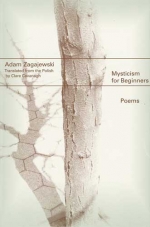 One of the great subjects of poetry, and one which I think remains uniquely well-exploited within the medium, is the multifaceted nature of human consciousness. Because poetry is made of language, and language is the vehicle for communicating, not only sensation, but feelings and ideas, good poetry seems to always, in some way, touch upon the protean nature of our awareness–whether directly, or by demonstration. Poems that embrace human complexity with equally attentive language attract me. Consider this wry little poem by Adam Zagajewski (b. 1945), entitled “The Thirties”:
One of the great subjects of poetry, and one which I think remains uniquely well-exploited within the medium, is the multifaceted nature of human consciousness. Because poetry is made of language, and language is the vehicle for communicating, not only sensation, but feelings and ideas, good poetry seems to always, in some way, touch upon the protean nature of our awareness–whether directly, or by demonstration. Poems that embrace human complexity with equally attentive language attract me. Consider this wry little poem by Adam Zagajewski (b. 1945), entitled “The Thirties”:
The thirties
I don’t exist yet
Grass grows
A girl eats strawberry ice cream
Someone listens to Schumann
(mad, ruined
Schumann)
I don’t exist yet
How fortunate
I can hear everything
Awareness plays out on many levels here, culminating in a moment of relishing the auditory imagination–after extolling “mad, ruined / Schumann” the speaker goes on to say that because he or she does not exist yet, that speaker can “hear everything.”
And yet, as much as this poem deals directly with layers of awareness, such layers exist to be played upon, in some way, in nearly every poem. They are like rungs or bars in gymnasium equipment, and, in poetry, we leap from level to level because we can. In life we must walk on the ground. But in poetry, we can perform acrobatics of consciousness. Consider another short poem by the same author, entitled “To My Older Brother”:
How calmly we walk
through the days and months,
how softly we sing
our black lullaby,
how easily wolves seize
our brothers,
how gently
death breathes,
how swiftly
ships swim
in our arteries.
Each line is a wonderful, if not terrible, surprise–culminating in the final startling proposition of ships swimming “in our arteries.”
Mysticism for Beginners is a treatise on consciousness, and a workout for heart and mind. Clare Cavanagh has done us English-readers a great service by transposing these poems so artfully from the Polish.